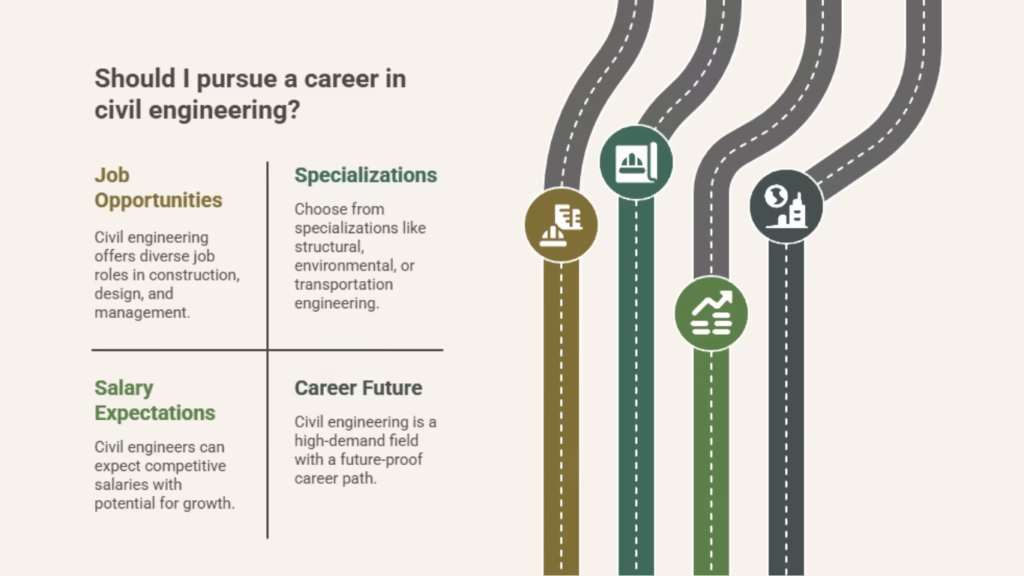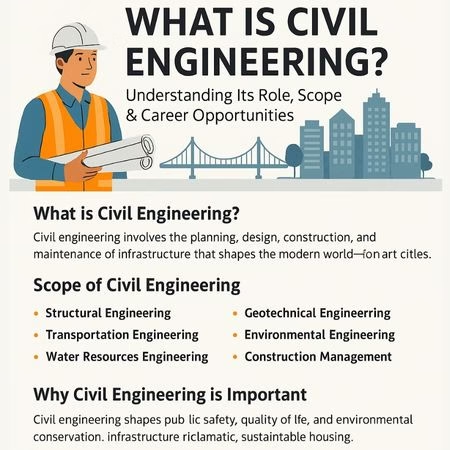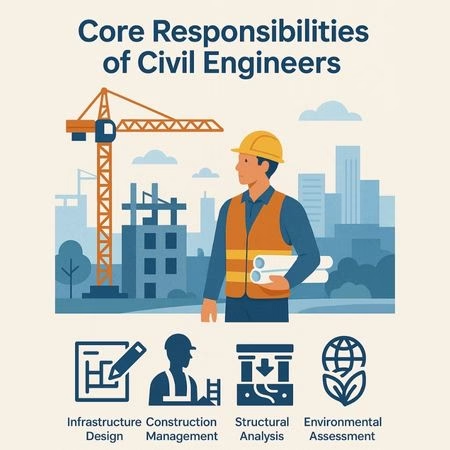Civil engineering is all around us — from the roads we drive on to the buildings we live and work in. It’s one of the oldest and most important branches of engineering, and in 2025, it’s more relevant than ever. Whether you’re planning to study civil engineering or looking to switch careers, this guide or article will walk you through everything you need to know — what civil engineers actually do, the types of jobs available, specializations you can choose, expected salaries, and how to build a future-proof career in this high-demand field.

Introduction: Understanding Civil Engineering as a Career Choice
Are you wondering “what does a civil engineer do” or considering civil engineering as a career? Civil engineering is the backbone of modern civilization, creating the infrastructure that enables societies to thrive. From ancient cave dwellings to today’s smart cities and sustainable buildings, civil engineers have shaped the world we live in.
Civil engineering job opportunities continue to grow as urbanization increases and infrastructure needs expand globally. This comprehensive guide covers everything from civil engineering career paths to civil engineering salary expectations and types of civil engineering jobs available in 2025.
What is Civil Engineering? Definition and Scope

Civil engineering is all about building the world we live in — not just physically, but functionally. It’s the field behind the roads we drive on, the bridges we cross, the water that flows into our homes, and the cities we grow up in.
In 2025, civil engineering isn’t stuck in the past. It’s taking on some of the world’s biggest challenges such as — designing flood-resistant cities, creating sustainable transport systems, supporting renewable energy, and helping build smarter, more resilient infrastructure for the future.
A civil engineer might work on a rural highway in one project, and a high-rise tower or metro rail system in the next. Their job is to make sure structures are not just built, but built to last — safe, efficient, and suited to the people using them.
Simply put, if it impacts how people move, live, or connect, civil engineers are involved.
Core Civil Engineering Responsibilities
What do civil engineers do on a daily basis? Civil engineering encompasses:

- Infrastructure design and planning – Creating blueprints for public and private facilities
- Construction project management – Overseeing building projects from start to finish
- Structural analysis and design – Ensuring buildings and bridges can withstand various loads
- Environmental impact assessment – Evaluating how projects affect the ecosystem
- Quality control and safety compliance – Maintaining construction standards and safety protocols
Civil Engineering vs Other Engineering Fields
Civil engineering vs mechanical engineering: While mechanical engineers focus on machines and mechanical systems, civil engineers concentrate on infrastructure and construction projects.
Civil engineering vs electrical engineering: Electrical engineers work with power systems and electronics, whereas civil engineers handle structural and infrastructure projects.
Types of Civil Engineering: Major Specializations and Career Paths
1. Structural Engineering Jobs and Opportunities
Structural engineering careers focus on designing and analyzing buildings, bridges, and other structures. Structural engineer salary ranges from $65,000 to $120,000 annually, depending on experience and location.
Key responsibilities:
- Building design and analysis
- Bridge engineering projects
- Earthquake-resistant structure design
- Load calculation and stress analysis
2. Transportation Engineering Career Options
Transportation engineering jobs involve planning, designing, and operating transportation systems including highways, railways, airports, and ports.
Career opportunities include:
- Highway design engineer
- Traffic engineering consultant
- Airport planning specialist
- Public transportation planner
3. l Engineering Career Path
Geotechnical engineering deals with soil mechanics, foundation design, and earth structure analysis. Geotechnical engineer jobs are essential for any construction project.
4. Environmental Engineering Opportunities
Environmental civil engineering focuses on water treatment, waste management, and pollution control. This growing field offers excellent environmental engineering career prospects.
5. Construction Management Careers
Construction management jobs combine engineering knowledge with project management skills. Construction manager salary typically ranges from $70,000 to $150,000 annually.
Civil Engineering Career Requirements and Education
How to Become a Civil Engineer: Step-by-Step Guide
Civil engineering education requirements:
- Bachelor’s degree in civil engineering (4 years)
- Civil engineering internship experience (recommended)
- Professional Engineering (PE) license (required for senior positions)
- Continuing education for license renewal
Best Civil Engineering Colleges and Programs
Top civil engineering schools offer comprehensive programs covering:
- Civil engineering curriculum basics
- Civil engineering software training (AutoCAD, STAAD Pro, SAP2000)
- Hands-on project experience
- Industry internship programs
Civil Engineering Certifications and Skills
Essential civil engineering skills:
- Technical skills: CAD software, structural analysis, project management
- Soft skills: Communication, problem-solving, leadership
- Industry certifications: LEED certification, PMP certification
Civil Engineering Job Market and Salary Expectations 2025
Civil Engineering Salary by Specialization
Entry-level civil engineer salary: $55,000 – $70,000 Mid-level civil engineer salary: $70,000 – $95,000 Senior civil engineer salary: $95,000 – $130,000+
Factors affecting civil engineering salary:
- Geographic location
- Years of experience
- Specialization area
- Company size and type
- Professional certifications
Civil Engineering Job Growth and Opportunities
Civil engineering job outlook remains positive with 8% expected growth through 2032, faster than the average for all occupations. High-demand areas include:
- Infrastructure rehabilitation projects
- Sustainable construction and green building
- Smart city development
- Disaster-resistant structure design
- Water management systems
Where Do Civil Engineers Work?
Civil engineering employers include:
- Government agencies and municipal departments
- Private consulting firms
- Construction companies
- Real estate development firms
- Infrastructure companies
- Environmental consulting firms
The Three Pillars of Civil Engineering: Balancing Society, Environment, and Infrastructure
1. Meeting Society’s Infrastructure Needs
Civil engineering impact on society includes:
- Housing and urban development – Creating safe, comfortable living spaces
- Water supply systems – Ensuring access to clean drinking water
- Public safety infrastructure – Designing earthquake and disaster-resistant structures
- Transportation networks – Efficient movement of people and goods
- Employment generation – Construction sector provides jobs for millions
2. Environmental Sustainability in Civil Engineering
Sustainable civil engineering practices focus on:
- Green building design and LEED certification
- Environmental impact mitigation
- Climate change adaptation in infrastructure design
- Water and air pollution control
- Renewable energy integration in projects
3. Creating Resilient Built Infrastructure
Modern infrastructure challenges require:
- Smart city technology integration
- Disaster-resistant design principles
- Long-term maintenance planning (100+ year lifespan)
- Cost-effective construction methods
- Quality assurance and safety standards
FAQs about Civil Engineering Career
What is civil engineering in simple words?
Civil engineering is the branch of engineering that deals with designing and building structures like roads, bridges, and buildings that serve public needs.
What are the main fields in civil engineering?
The major fields include structural, transportation, geotechnical, environmental, and construction engineering.
What is the role of a civil engineer?
A civil engineer plans, designs, supervises, and manages construction projects to ensure safety, stability, and functionality.
Is civil engineering a good career?
Yes, it’s a respected career with opportunities in infrastructure development, real estate, and public projects, especially in growing economies.
What skills are needed to be a civil engineer?
Key skills include technical drawing, structural analysis, problem-solving, project management, and software tools like AutoCAD and STAAD.
Is civil engineering a good career in 2025?**
Yes. With infrastructure development and smart cities booming, demand is high.
Which civil engineering specialization has the highest salary?
Structural engineering, construction management, and environmental engineering tend to pay the most.
Can I get a government job as a civil engineer?
Absolutely. Civil engineers are in demand in PWD, NHAI, Indian Railways, and more.
How long does it take to become a civil engineer?
4 years for a bachelor’s degree, plus internship experience. Some roles require licensing.





